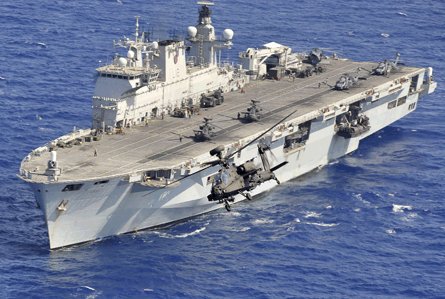The British Army has identified a need to incorporate several enhancements to its Westland/Boeing Apache AH1 attack helicopters, if the type is to be used again in the maritime role debuted during NATO's Unified Protector campaign over Libya.
Flown operationally from the Royal Navy helicopter carrier HMS Ocean between 29 May and 24 August, Army Air Corps (AAC) Apaches completed about 25 strike missions against regime targets in Libyan cities including Brega and Tripoli. They completed their last attacks on 6 August, and in total struck more than 100 targets, including ground vehicles, buildings and air defence system equipment.
Roughly 40 missions had been planned for the Apaches during their first maritime commitment, but several of these were not flown due to insufficient intelligence information and the threat posed by anti-aircraft systems, said Lt Col Paul Tennant, commanding officer of the AAC's 3 Regt.
Swiftly introduced as an operational capability following trials performed in early May, the Apache's sorties from HMS Ocean enabled the army to hone its procedures for storing weapons and re-arming the aircraft on deck, Tennant told Shephard's HeliPower conference in Farnborough, Hampshire, UK, on 20 October.
 |
|---|
© Crown Copyright |
It also exposed several shortcomings of the Apache for embarked operations, such as its current main rotor brake design, which was not strong enough under high wind conditions.
Crews also expressed concerns about the likely outcome of any ditching event, should they be unable to make it back to the ship.
"We need some sort of a flotation device, as the aircraft would sink like a stone," Tennant said. A new canopy jettison system would also be required, he said, as the current design could have fatal consequences if used once the aircraft is in the water.
The addition of an I-band transponder would aid crews' ability to navigate back to a ship, while an improvement is also needed in battery life to increase flight time from just 6min in the event of a total electrical system failure, he added.
With the British Army currently concentrating its efforts on supporting the NATO-led mission in Afghanistan, Tennant said the AAC will not be in a position to sustain an enduring Apache presence onboard ship until 2015, but that it could repeat a short-duration action such as that required over Libya.
The UK has maintained a continuous detachment of Apaches in Afghanistan since 2006. Its only accident involving the type during this time involved an aircraft which crashed in severe brownout conditions due to pilot error in 2008. Both crew members escaped injury.
Source: Flight International























